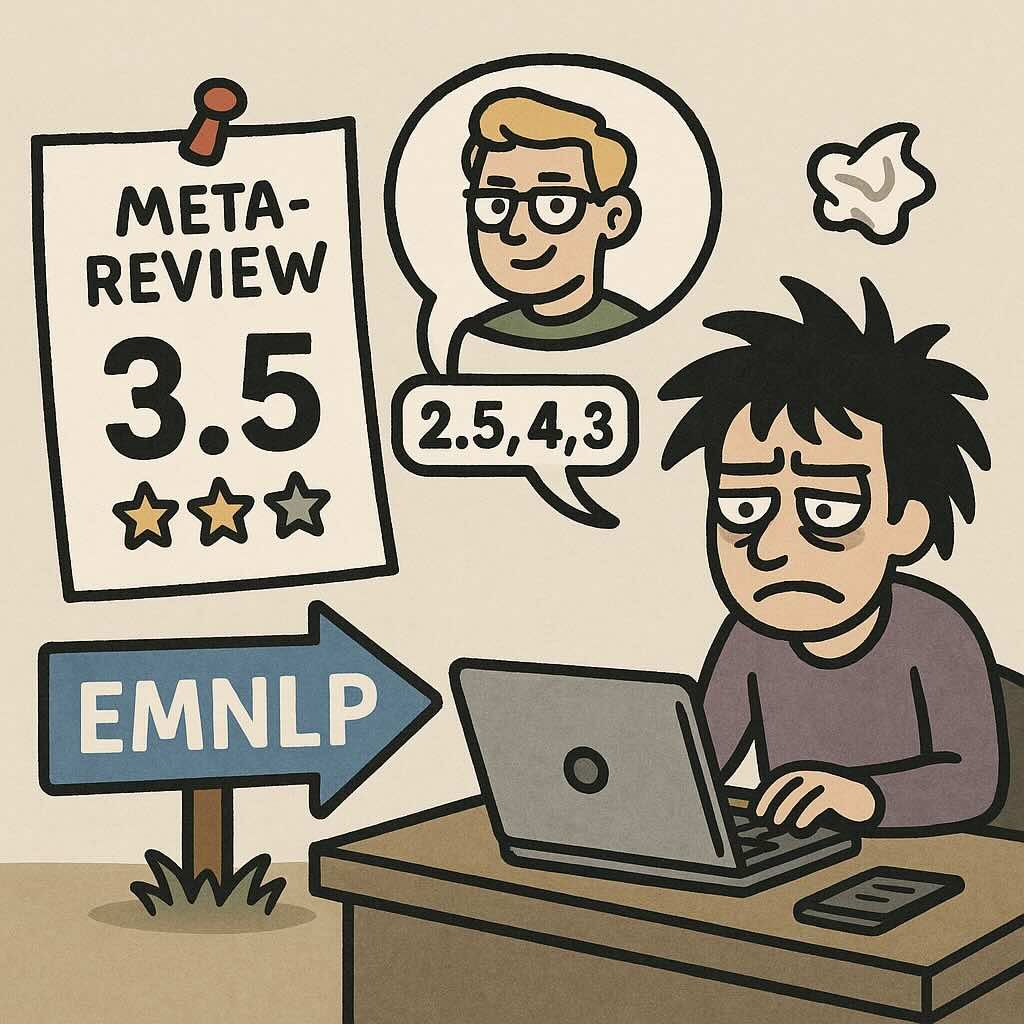Surviving ARR May Meta-Review & Deciding on EMNLP 2025: A Tactical and Honest Guide
-
 Meta-Review Release: What Happened?
Meta-Review Release: What Happened?On July 26, 2025 AOE, authors from the ACL Rolling Review (ARR) May 2025 cycle received their meta-reviews — and a correction that the ARR July 2025 deadline is actually July 28, not July 29 (yes, another OpenReview quirk).
If you submitted, you should have received:
- Reviews and meta-review on OpenReview
- Commitment link for EMNLP 2025: Commit here
- Deadline: August 1, 2025 AOE to commit your paper
Reminder: if you want to resubmit to the next ARR cycle instead, deadline is July 28, 2025 AOE

🧩 TL;DR Options
Option Meaning Deadline Commit to EMNLP Your current reviews & meta go to EMNLP SPC for a final decision August 1, 2025 AOE Resubmit to ARR July Revise based on feedback and try again July 28, 2025 AOE Go elsewhere Submit to another venue. No need to withdraw from ARR. –  ️ You cannot do both! Committing = no ARR July. Resubmitting = no EMNLP this year.
️ You cannot do both! Committing = no ARR July. Resubmitting = no EMNLP this year.
🧠 Should You Commit to EMNLP?
Let’s break it down based on score combos and realistic expectations.
 1. Green Light (Strong Meta & Reviews)
1. Green Light (Strong Meta & Reviews)Example: Meta 3.5, Reviews 4 / 3.5 / 3.5
Track: Language Modeling- Chances: High for Main Track, at least Findings
- Do: Consider optional response to meta-review. Commit with confidence.
 ️ 2. Borderline (Mixed Reviews, Decent Meta)
️ 2. Borderline (Mixed Reviews, Decent Meta)Example: Meta 3, Reviews 4 / 3 / 3
Track: NLP Applications- Consider:
- Are your Soundness scores 3.5+?
- Did your rebuttal clarify issues even if scores weren’t updated?
- Is the meta-review positive overall?
If yes, then go for Findings. You might squeeze into the main if the track isn’t highly competitive.
 3. Red Flag (Bad Review Tanked It)
3. Red Flag (Bad Review Tanked It)Example: Meta 3, Reviews 3 / 3 / 1.5
Reviewer 1.5: Irrelevant, maybe even LLM-generated- Do:
- File a meta-review issue before July 26 AoE (if still possible)
- If not: think hard before committing. If you do commit, you're locked in.
- Strongly consider resubmitting with a revised draft and a solid resubmission note.
 4. No-Go (Low Meta & Consensus)
4. No-Go (Low Meta & Consensus)Example: Meta 2.5, Reviews 3 / 2.5 / 2
- Chances: Nearly zero
- Best Path: Resubmit. Fix issues. Add new experiments. Clarify contributions. Live to submit another day.
 ️ How to Use the Meta-Review
️ How to Use the Meta-Review- If it’s positive, awesome.
- If it missed key points (e.g. says you didn’t do X when you clearly did), use the "response to meta-review" to clarify.
- Stay factual, not emotional. No roasting.
- Score averaging is misleading. Focus on Soundness, Originality, and Confidence.
 If You Choose ARR July Instead
If You Choose ARR July InsteadARR treats this as a resubmission. You must:
- Disclose it: Fill the resubmission policy box
- Be specific: Point out exact changes you made
- Avoid reflagging: Change title, abstract, and structure if the framing changed
 ️ Some authors were flagged as duplicate submissions just for reusing 2 term definitions — be careful!
️ Some authors were flagged as duplicate submissions just for reusing 2 term definitions — be careful!
🧂 Community Wisdom & Catharsis
-
“Ran into an overconfident undergrad reviewer who started off by claiming BERT and GPT-2 aren’t language models?”
-
“The meta-reviewer just copied the 2.5-score review—despite the fact that I rebutted everything and still didn’t get a score bump.”
-
“Meta: 3.5, Soundness: 4.5, 4.5, 3 — feels like there’s a real chance!”
-
“I really shouldn’t have stayed up all night writing the rebuttal and adding 9 more experiments… now I’m just praying for a Findings acceptance…”
 Finally
Finally- Meta ≥ 3.5? → Commit with confidence.
- Borderline? → If soundness is high and rebuttal was strong, you have a shot.
- Low meta or poor review logic? → Consider resubmitting with revisions.
- Still unsure? → Draft a neutral, factual response to meta-review.
- Feeling demoralized? → You are more than your meta score.
Good luck with your next steps!

